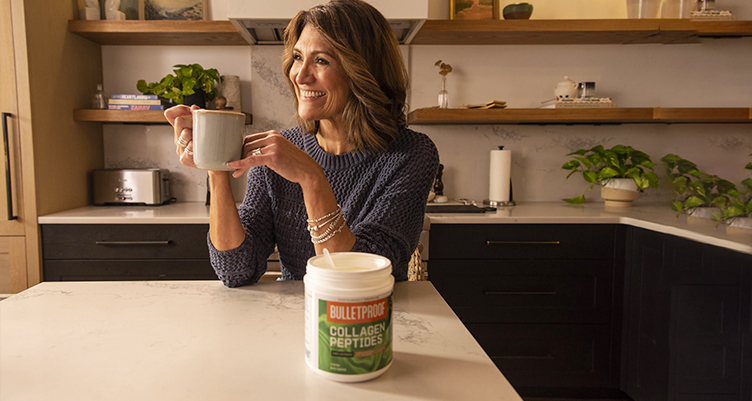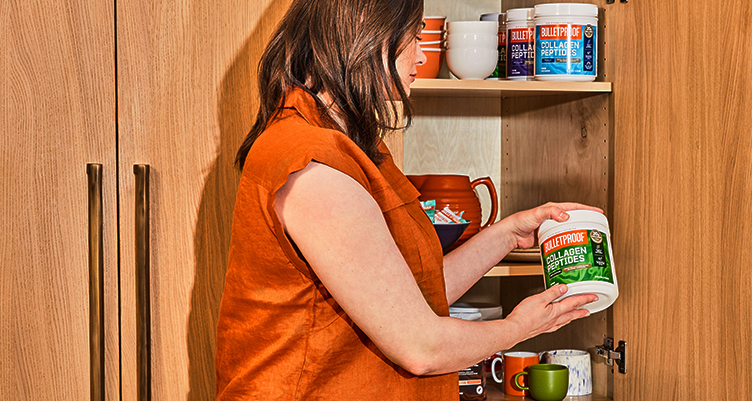Biotin vs Collagen: What’s the Difference?

- Collagen is the body’s most abundant protein. It provides important benefits like muscle recovery and relief from joint discomfort.
- Biotin is a B vitamin that benefits hair health and nail growth. It is found in foods like sweet potato and cauliflower.
- Collagen protein is naturally found in our bodies, but we produce less as we age. Our bodies cannot produce biotin. Supplementation can be a great source of both nutrients
In this “biotin vs collagen” explainer, we take a closer look at their common benefits and what exactly sets the two apart.
Both biotin and collagen supplements are popular due to their potential benefits for skin, hair and nails.You may see both terms while exploring products, causing confusion, especially if you are new to the world of supplements and wellness. But biotin and collagen are distinct substances with different roles in the body.
Collagen is the body’s most abundant protein. Biotin is a vitamin that’s associated with beauty benefits. They’re both important—but how are they different?
Biotin vs Collagen: What’s the Difference?
The most obvious difference between biotin and collagen is its role in the body. Collagen, which is best known for promoting a more youthful-looking appearance (among other benefits), is naturally produced in the body. That begins to decline after the age of 20,[1] leading to more wrinkles and sagging skin. Collagen supplements may help to make up for the loss.
Unlike collagen, the body does not produce biotin; instead, we reap biotin’s health benefits through foods. Biotin supplements are also available, although not entirely needed.

What Is Biotin?
To start, what is biotin? Biotin, or vitamin B7, is part of the B vitamin family. In Germany, biotin is known as vitamin H since it helps with “haut and haar” (“skin and hair” in German). Biotin is needed to produce keratin,[2] the key protein found in hair, skin, and nails. An easy way to remember the vitamin’s benefits: The “b” in biotin also stands for beauty.
What Is Collagen?
Made up of the amino acids glycine, proline, and hydroxyproline, collagen is the body’s most abundant protein. Collagen is the building block for healthy bones, teeth, muscles, skin, joints and connective tissues. Without it the body would not be able to stand or perform on its own.
What Are the Health Benefits of Biotin and Collagen?
Both collagen and biotin help strengthen hair, skin, and nails. However, the benefits of collagen extend to bone and joint health, while the benefits of biotin focus on hair, skin and nail health.
Benefits of Biotin
[3] In another study, biotin was found to help increase hair growth and thickness.[4] And a third study found that biotin maintained skin hydration in 30 study participants.[5]
Benefits of Collagen
In addition to supporting healthy hair, skin, and nails, collagen also has a positive impact on our joint and bone health.[6] A recent study on the effectiveness of collagen peptide[7] found that collagen helped bring comfort to sore knees.

What Foods Contain Biotin and Collagen?
An easy and nutritious way to increase your intake of both collagen and biotin is through food. Incorporating a biotin or collagen supplement is a great way to ensure you are meeting your body’s needs. But did you know foods that contain collagen and foods that contain biotin are likely already available in your kitchen? Boost your daily diet with these nutrient-rich foods.
Foods with Biotin
Foods that are high in biotin include beef liver, eggs, salmon, avocados, mushrooms, pork, sweet potato, nuts, seeds, and cauliflower. Try our Paleo Sweet Potato Salmon Patties or Keto Ramen for a healthy double dose of biotin.
Foods with Collagen
Foods high in collagen include organ meats, eggs, tougher cuts of meat cooked low and slow, and bone broth. You can make bone broth at home by boiling beef bones in a pot of water with carrots and celery, then pour into a cup and enjoy. Check out our Homemade Collagen Bone Broth Recipe for a more detailed recipe and healthy tips.
How Much Biotin and Collagen Should You Take?
The recommended biotin dosage varies by sex and age.[8] For both people above the age of 19, the NIH recommends a daily biotin intake of 30mcg. Except for a few rare cases, most people do get enough biotin from the foods they eat.[9]
In the case of how much collagen to take, it is typically recommended to take 10-30g of collagen protein supplements every day. From collagen peptide powders to collagen protein bars, there are different types of collagen supplements for every lifestyle.
We always recommend consulting with your licensed healthcare practitioner before introducing a new supplement to your diet.

Regardless of your “biotin vs collagen” preference, the vitamin and protein are both vital to your well-being. We primarily need collagen for healthy bones and joints, and we need biotin for healthy hair, skin, and nails.
Sign up for early access to sales, product launches, the latest Bulletproof news and more!



